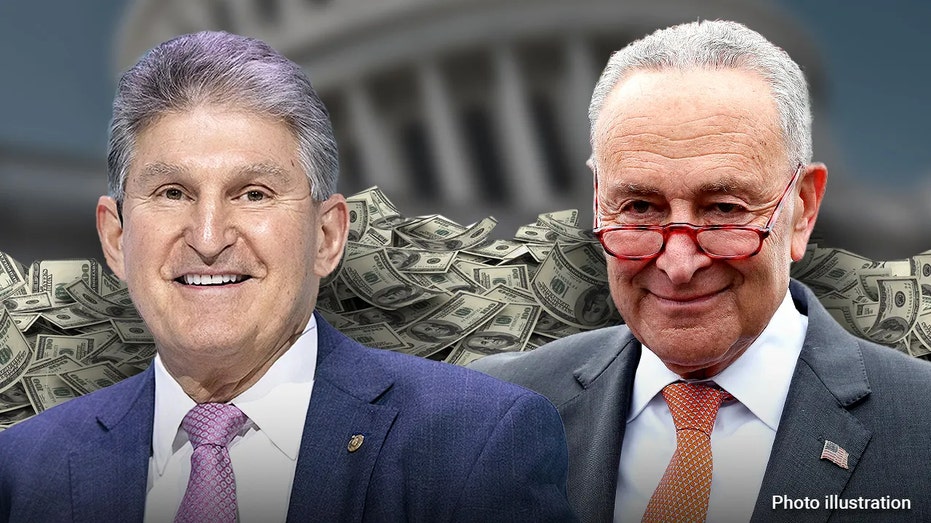What's inside the Dems reconciliation bill, Biden denies recession and more: Friday's 5 things to know
Personal income and spending, Employment Cost Index and more will provide a better idea of how the economy is performing
Here are five key things that could impact Friday's trading.
OUTLINE UNVEILED: Senate Majority Leader Chuck Schumer, D-N.Y., and Sen. Joe Manchin, D-W.Va., unveiled the outline of a new tax, climate and health care proposal on Wednesday, a stunning reversal that marks a major breakthrough for President Biden's long-stalled economic agenda.
The reconciliation bill — repackaged by Democrats as the Inflation Reduction Act of 2022 — would raise an estimated $739 billion over the next decade, with the revenues going toward initiatives designed to combat climate change and curb pharmaceutical prices, as well as efforts to reduce the nation's $30 trillion debt.
It includes about $433 billion in new spending, while roughly $300 billion of the new revenue raised would go toward paying down the nation's deficit — a priority for Manchin.
MANCHIN AGREES TO EXTENSION OF TAX CREDIT FOR ELECTRIC VEHICLE PURCHASES IN REVERSAL

A photo illustration showing Joe Manchin and Chuck Schumer with money and the U.S. Capitol building in the background.
While the bill's future remains uncertain in the 50-50 Senate, if passed it would amount to one of the largest tax hikes in decades. Still, it's a far cry from the ambitious $3 trillion agenda that Biden rolled out last year that relied on major tax increases on wealthy Americans and corporations — and that Manchin subsequently killed.
The legislation would impose a 15% minimum tax on the book income of corporations. The tax would hit the profit that corporations publicly report on their financial statements to shareholders.
Under the bill, the government would have the power to negotiate with drugmakers in order to lower prices for certain prescription drugs. The proposal would cap what seniors on Medicare pay out of pocket for drugs each year at $2,000.
If pharmaceutical companies raise the prices of their drugs more than the rate of inflation, pharmaceutical companies would be required to rebate Medicare.
The Internal Revenue Service would receive $80 billion in order to enhance tax enforcement by hiring more agents and introducing new technology to pursue tax dodgers.
The plan from Manchin and Schumer would repeal the break for carried interest, which allows private equity fund managers to pay lower taxes on their earnings than they would for regular income. The loophole allowed for part of an investment manager's income to be taxed as a capital gain — a 23.8% levy — rather than regular income.
BIDEN: ‘NOT IN A RECESSION’: President Biden said the United States "is not in a recession," despite Thursday's GDP report, saying it is "no surprise that the economy is slowing down" amid inflation.
The U.S. economy shrank in the spring for the second consecutive quarter, meeting the criteria for a recession as record-high inflation and higher interest rates forced consumers and businesses to pull back on spending.
Gross domestic product, the broadest measure of goods and services produced across the economy, shrank by 0.9% on an annualized basis in the three-month period from April through June, the Commerce Department said in its first reading of the data on Thursday. Refinitiv economists expected the report to show the economy had expanded by 0.5%.
"Coming off of last year’s historic economic growth — and regaining all the private sector jobs lost during the pandemic crisis — it’s no surprise that the economy is slowing down as the Federal Reserve acts to bring down inflation," Biden said Thursday in a statement. "But even as we face historic global challenges, we are on the right path and we will come through this transition stronger and more secure."
US ECONOMY ENTERS TECHNICAL RECESSION AFTER GROWTH TUMBLES 0.9% I THE SECOND QUARTER

After the U.S. economy shrank in the second quarter, a sign the economy is in a recession, President Biden continues to insist there is no recession. (AP Photo/Andrew Harnik / AP Newsroom)
Biden touted the job market, saying it "remains historically strong, with unemployment at 3.6% and more than 1 million jobs created in the second quarter alone."
"Consumer spending is continuing to grow," he said.
Biden said he met with the chairman of SK Group from Korea earlier this week, saying it is "just one of the companies investing more than $200 billion in American manufacturing since I took office, powering a historic recovery in American manufacturing."
"My economic plan is focused on bringing inflation down, without giving up all the economic gains we have made," he said. "Congress has an historic chance to do that by passing the CHIPS and Science Act and Inflation Reduction Act without delay."
Biden's comments came just days after he said the U.S. was "not coming into recession."
"We're not coming into recession, in my view," Biden said Monday. "I don't think we're going to — God willing — I don't think we're going to see a recession."
Recessions typically refer to two consecutive quarters of negative economic growth.
STILL MORE ECONOMIC DATA: A busy week for macroeconomic data ends with a flourish on Friday when the first of four reports are released.
At 8:30 a.m. ET, the Commerce Department releases personal income and spending numbers for June. Economists surveyed by Refinitiv anticipate spending to rise 0.9% month-over-month, well above May’s 0.2% growth. Personal income, meantime, is expected to rise 0.5% in June, matching May’s gain. Core personal consumption expenditures, which remove volatile food and energy prices, are seen rising 0.5% month-over-month, higher than May’s 0.3% increase.
The year-over-year change in core PCE, which is the Federal Reserve’s preferred measure of inflation, is expected to hold steady at 4.7%. That’s down from a 39-year high of 5.3% in February and would support the view that inflation has peaked.
Still, it would also mark the 15th consecutive month that inflation was above the Fed’s 2% target and could boost expectations for a third 75-basis point rate hike at the Fed’s September policy meeting. Futures currently indicate a 100% chance for a 50-basis point hike, with a 24% chance for a 75-basis point increase.
Also scheduled for release at that time is the Employment Cost Index. It’s expected to jump 1.2% in the second quarter, down from a larger-than-expected increase of 1.4% in the first quarter, a level not seen since the second-quarter of 1990.

The Commerce Department is scheduled to release personal income and spending numbers for June on Friday, July 29, 2022. Economists surveyed by Refinitiv anticipate spending to rise 0.9% month-over-month, well above May’s 0.2% growth. (Jeffrey Greenberg/UCG/Universal Images Group via Getty Images / Getty Images)
The ECI is considered the most comprehensive gauge of labor costs. Another higher-than-expected reading could add to inflation fears and put pressure on bonds and stocks.
Then, at 9:45 a.m. ET, the Institute for Supply Management is out with its Chicago Purchasing Managers’ index for July. The closely watched gauge of Midwest business activity is anticipated to fall for the third time in four months to 55.0, the lowest since August 2020. Recall that 50 is the dividing line between expansion and contraction. The report is seen as a curtain-raiser to the all-important national ISM number out on Monday.
Finally, at 10 a.m. ET, watch for the University of Michigan’s final index of consumer sentiment for July. It’s expected to hold steady at the preliminary reading of 51.1, which was up slightly from a record low of 50.0 in June when record-high gasoline prices drove inflation fears.
EARNINGS REPORTS GALORE: The busiest week for second-quarter earnings wraps up Friday morning with a big focus on energy.
Among those releasing reports are integrated oil and gas giants ExxonMobil and Dow member Chevron, along with refiner Philips 66.
In addition, watch for numbers from another Dow company, personal-care products maker Procter & Gamble.
| Ticker | Security | Last | Change | Change % |
|---|---|---|---|---|
| XOM | EXXON MOBIL CORP. | 149.05 | +2.97 | +2.03% |
| CVX | CHEVRON CORP. | 180.86 | +1.63 | +0.91% |
| PSX | PHILLIPS 66 | 157.80 | +3.37 | +2.18% |
| PG | PROCTER & GAMBLE CO. | 159.17 | +0.56 | +0.35% |
| ABBV | ABBVIE INC. | 223.43 | +4.41 | +2.01% |
| CHTR | CHARTER COMMUNICATIONS INC. | 238.06 | +6.92 | +2.99% |
| CL | COLGATE-PALMOLIVE CO. | 94.41 | -0.47 | -0.50% |
| NWL | NEWELL BRANDS INC. | 4.57 | -0.07 | -1.40% |
Also reporting results will be be biotech firm AbbVie, cable and satellite giant Charter Communications, household products maker Colgate-Palmolive and consumer goods manufacturer Newell Brands
A little more than half the companies in the S&P 500 have reported quarterly results.
CLICK HERE TO READ MORE ON FOX BUSINESS
SPIRIT CHOOSES JETBLUE: Spirit Airlines climbed $1.36, or 5.6%, to $25.66 after JetBlue Airways agreed to buy the carrier. The deal came after The Wall Street Journal reported that the two sides were close to sealing an agreement following a months long bidding war between JetBlue and Frontier Group Holdings. JetBlue dropped 3 cents, or 0.4%, to $8.37.




















